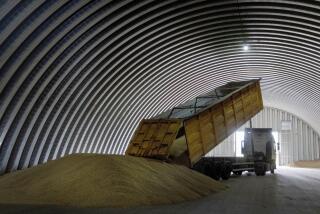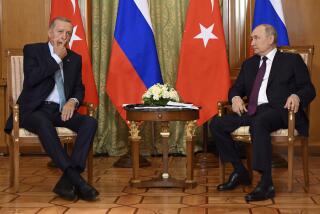Russian Republic Plans to Import Its Own Food
- Share via
MOSCOW — The Russian Federation, the largest of the Soviet republics and one of the hardest hit by shortages, announced plans Thursday to import tens of billions of dollars’ worth of food and other consumer goods over the next year.
Deputy Prime Minister Gennady I. Filshin said Russian authorities are on the verge of signing contracts with major American, European, Japanese and South Korean companies to buy massive quantities of sorely needed goods in exchange for rubles, the weak Soviet currency that foreign firms usually spurn because it is virtually worthless outside the country.
In the pending deals, Filshin said, the foreign companies will be able to invest the rubles under favorable conditions in such promising Soviet industries as oil, gas, wood and metallurgy, which have been largely closed to Western investment.
He acknowledged, however, that it is possible that the central Soviet government, which contests the Russian Federation’s claim to control of natural resources and industry on its territory, would block the Russian initiative.
The Russian Federation, which stretches across three-quarters of the Soviet Union’s territory and is home to half its population, declared its sovereignty this year and asserted its right to decide its own economic affairs.
But when Russian President Boris N. Yeltsin tried to assert control over banking and natural resources in the republic--including its vast deposits of gold, diamonds and oil--Soviet President Mikhail S. Gorbachev blocked him, and Yeltsin backed down.
Filshin, an economist who is known for his reformist views, refused to provide details of the planned agreements or the foreign companies that would be involved. But the deals would presumably be based on the foreign firms’ purchase of the food and consumer goods for hard currency and their resale to the Russian government for rubles.
Russia is forced to turn to imports as the only way to lay the groundwork for radical economic reforms that would free prices from state control and encourage private property, he told a Kremlin news conference.
“You can’t free prices when you have empty shelves,” Filshin said. “The only kind of market you have then is a black one, and we can’t allow that.”
The imports will also help soak up the hundreds of billions of rubles that Soviet consumers are holding because there is nothing to buy. The extra rubles have contributed to mounting inflation, estimated at 8% or 9% a year by the government and 80% by independent economists who take black market prices into account.
Filshin said that “tens of billions of dollars” is his best estimate for the scale of imports required to fill Soviet shelves. He added that he believes “it will take $60 billion to solve the whole problem” of consumer supplies and the shrinking ruble.
“I repeat, this is not loans--it is investment in our economy,” he said.
Foreign firms will be allowed to dispose of up to 50% of the output of the industries in which they invest their rubles, Filshin told the independent news agency InterFax earlier. They could thus export oil, gas or wood for hard currency to recover their investment in imported food and consumer goods.
The imports, which will consist at first mainly of meat, butter, dry milk and fruits, are necessary only as a stopgap, he stressed, until economic reforms take hold and begin paying off sometime in late 1991 or in 1992.
“The main question here is the stability to keep society tolerant until things get better,” he said.
Filshin said he had discussed the food import plan with central government officials and “received understanding.” But he admitted there are no guarantees, and the Soviet government could stand in the way of the deals.
More to Read
Sign up for Essential California
The most important California stories and recommendations in your inbox every morning.
You may occasionally receive promotional content from the Los Angeles Times.













